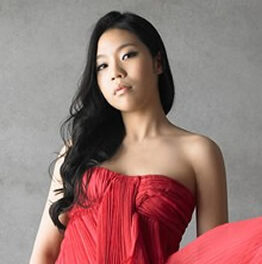These players from East Carolina University took to the floor with a potent attack on two standard works in Carswell Concert Hall on the Meredith College campus. The first movement of Fauré’s Piano Quartet No. 2 was the vehicle that violinist Hye-Jin Kim, violist Melissa Reardon, cellist Raman Ramakrishnan and pianist Keiko Sekino chose for a gloriously thunderous opening. All four of these musicians can lay claim to impressive artistic credentials, both here and abroad.
With energy not normally associated with Fauré, the ad hoc quartet commenced the movement’s long unison melody. Violist Reardon, appearing on stage all too briefly in this single movement, introduced the peaceful and lyrical secondary passages, blending pleasingly with the cello of Ramakrishnan. Although this cellist was the only player in the group not a member of the East Carolina faculty, he is nevertheless well known around the Triangle area. His most recent appearance in Raleigh was just under a year ago as a founding member of the rightly celebrated Daedalus Quartet.
After a brief pause three of the players launched into the magnum opus of the evening. Schubert’s Piano Trio No. 1, D. 898, is a gem of the chamber literature. The violin and cello opened the first of four movements (allegro), with the piano repeating the same subject, all instruments at or near full volume.
Ardent fans of Schubert’s piano trios probably waited expectantly for the Andante movement. They should not have been disappointed. The cello introduced the fetching melody, followed by the violin and then the piano. Violinist Kim showed why she has been so widely honored, one reviewer having praised the “… heart-stopping, unrivaled beauty…” of her artistry. No less striking was the work of pianist Sekino. Her musicianship was impressive throughout the evening, particularly so, it seemed, in the aggressive closing Rondo movement where she negotiated those challenging measures with so apparent equanimity.
Here were four musical artists of truly world-class caliber. It must remain one of life’s minor mysteries how Meredith music students are able (permitted) to miss out on such a major enhancement to their education. The privilege of seeing and hearing performances like these would seem to be a blessing not lightly brushed aside.











